—————————————————————————————————————————————————————————————————————
Moving everyone forward
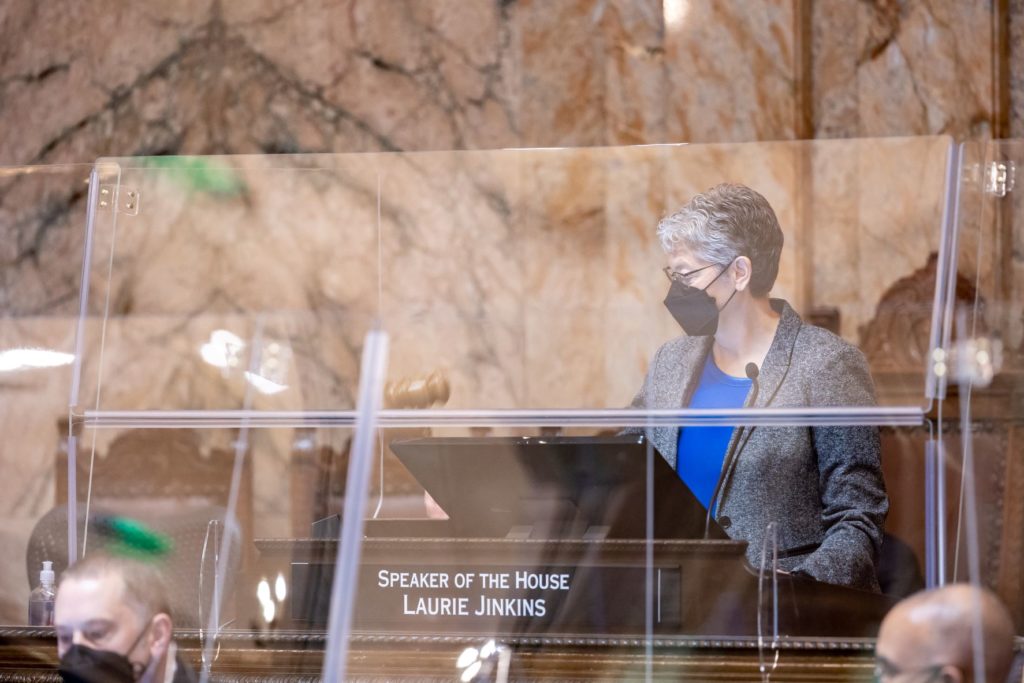
Dear friends and neighbors,
Hello from Olympia, where the 2022 legislative session got underway on Monday!
As one of the presiding members, I am one of a small handful of lawmakers in person on the House floor at this time. With the rapid spread of the omicron variant, the House unfortunately had to shift from its original plan of beginning the session in hybrid format to mostly remote (you can read the 2022 House COVID-19 session operations plan here).
Even though I am fully vaccinated and boosted, before entering the House chamber on floor session days, I and other legislators, staff, and members of the press are also required to take a COVID test on site. This helps protect everyone in the legislative community who is here in person.
We will reassess the situation every two weeks and adjust House operations according to the dynamics of the pandemic, and state and local public health guidance.
My priorities for this short, 60-day session remain safety, transparency, and doing the people’s work. I know we can accomplish all three of these because last year the Legislature made unprecedented changes to how we operated in order to be more transparent and accessible to the public.
And it worked: we had historic levels of public engagement in the 2021 session and passed the Washington Recovery Budget.
So what are the priority bills for this session? This year is all about focusing on policies addressing our state’s most urgent needs and making sure everyone MOVES FORWARD as we get through this pandemic. As I said in my opening day remarks, previous economic recoveries in our state haven’t always brought everyone along. We need to make sure EVERYONE recovers from this pandemic in a healthier and more
economically-resilient way.
House Democrats will be moving forward with bills strengthening economic well-being and ensuring the services Washington provides get to everyone in a way that Washingtonians can use them to better their lives.
We’ll also be championing policies advancing racial equity and justice and addressing the climate crisis, as we did last year. These are complex issues requiring ongoing commitment and work, and cannot be solved in just one session.
I’m excited to do this work on behalf of the 27th District and the people of the great state of Washington.
Be part of the legislative process
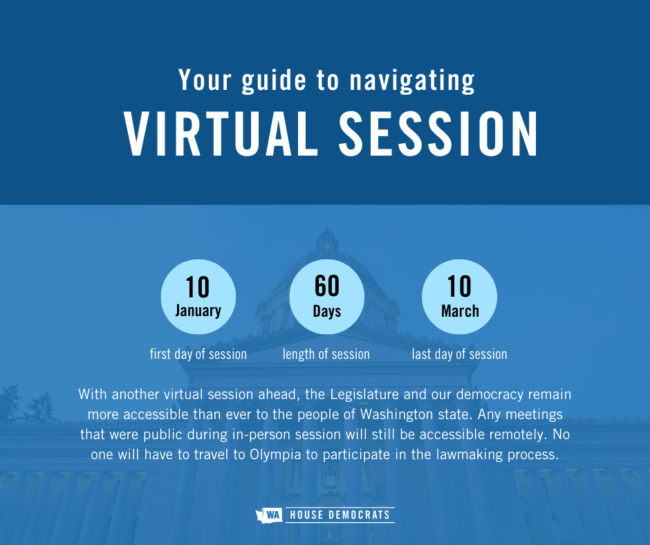
The Legislature’s web site has a helpful page that is a one-stop shop for information about how you can participate in the legislative process. Testify remotely on a bill, submit written testimony, send me your comments on a bill, and more. Public input is essential to good policymaking.
You can also follow my legislative Facebook page, as well as the House Democrats Facebook page, and the House Members of Color Caucus Facebook page for more informal but informative posts about bills under consideration and other legislative news and info.
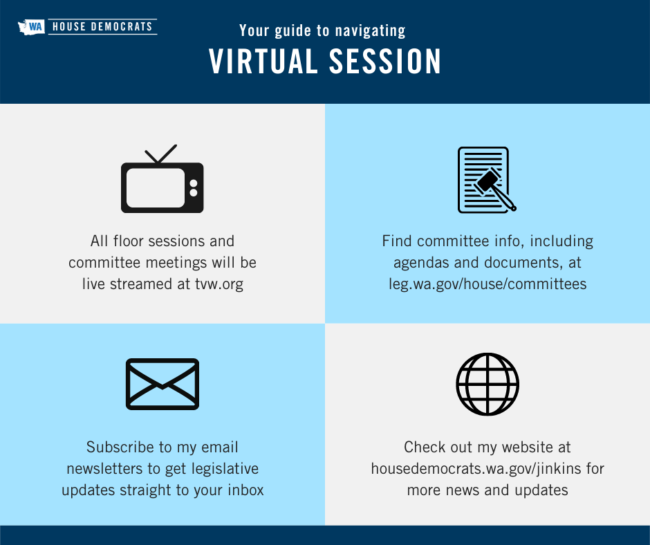
You can also reach out to me with your comments, questions, or concerns.
It’s an honor to represent you.
Sincerely,

Get involved: The 2022 legislative session is around the corner
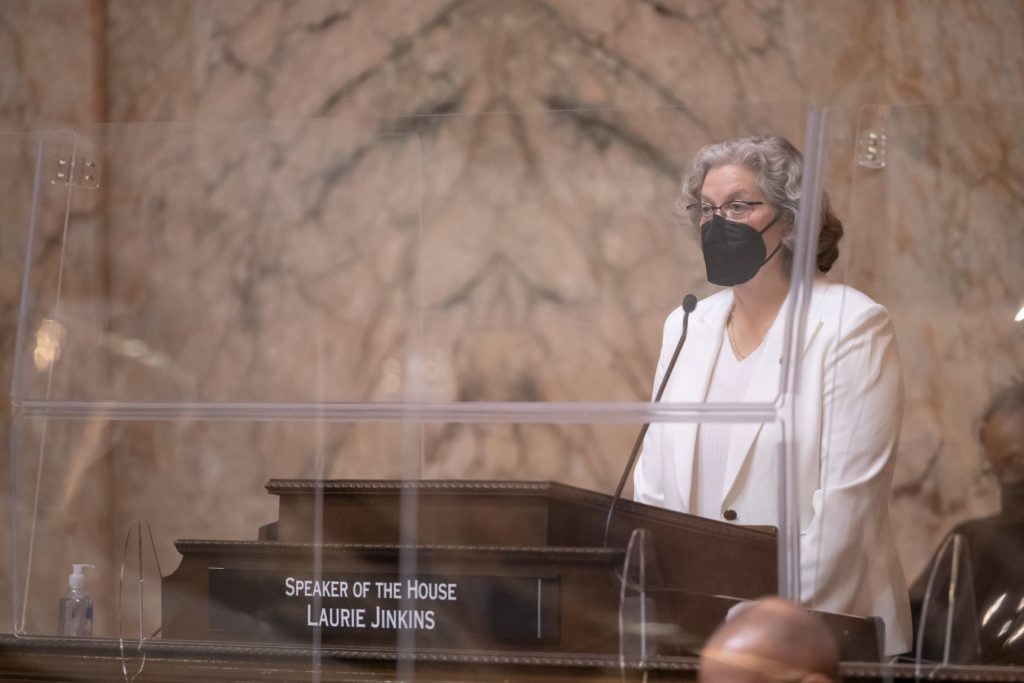
Dear friends and neighbors,
There is lots of legislative activity happening this week, with Committee Assembly Days in both the House and Senate. Senate committees met on Monday and Tuesday, and House committees convene today and tomorrow.
All meetings are public and are being conducted remotely in order to adhere to local and state public health guidance. The House of Representatives website has details like dates, times, agendas and documents for these meetings, as well as links to live video. If you are unable to tune in live, the meetings will also be available for later viewing in the TVW archives.
Committee Assembly Days is when committees gather for work sessions on policies and issues likely to come before the Legislature in the next session. With the 2022 session convening on January 10, we are only a few weeks away from the start of another legislative session!
In even-numbered years, legislative sessions are 60 days, as opposed to 105 days in odd-numbered years. The 60 days go by quickly, and I know many of you are waiting to hear how the House will conduct business this year (remote? in-person? hybrid?). I expect the final session operations plan for the House to be made public before the Thanksgiving holiday, and it will be posted to the House website and linked on my legislative Facebook page.
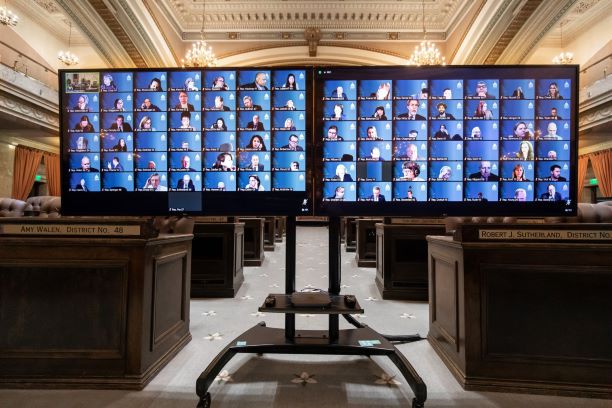
If you have ever been to the Capitol campus, you may have been to the John L. O’Brien Building – also known as JLOB – where many House members have their legislative offices. The corridors in JLOB are tight and member offices cannot safely hold more than one person in most cases. The House also has twice as many members as the Senate, so while it is possible for our colleagues in the other chamber to gather in person on the Senate floor while maintaining proper social distancing, for the 98 members in the House this is not possible. Committee hearings also pose a social distancing challenge.
At the same time, all members of the House Democratic Caucus are fully vaccinated (I got my booster shot recently!), and there is a strong desire among legislators – myself included – to do more in person this coming session.
The final plan will most likely be some version of a hybrid session, with the goals of keeping the safety of the public, members, and staff paramount while operating transparently and safely.
It’s important to remember the unprecedented changes made last session in order to be more transparent and accessible to the public in the midst of the pandemic. More people across our state than ever were able to testify on bills and meet with their legislators without having to leave their homes and travel all the way to Olympia. Lawmakers will continue to have the opportunity to meet with constituents virtually over Zoom, or in district if they choose in compliance with local and state public health guidance. And I’m hoping we’ll see more legislators in person on the House floor – safely distanced – than last year.
Redistricting: What comes next
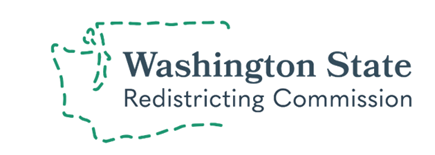
The Washington State Redistricting Commission reached an agreement on new legislative and congressional district maps late Monday night. Commissioner April Sims, who I appointed to represent the House Democratic Caucus in the redistricting negotiations, informed me of the agreement when it was reached. I have been incredibly proud of Commissioner Sims’ steadfast commitment to the negotiations and to this very important work for our state. There are not enough words to convey my gratitude for how she lived up to the values and duties required of a redistricting commissioner.
As the commissioners were finishing drafting maps based on their agreement, the clock ticked past midnight and for that reason the redistricting process now falls under the jurisdiction of our state Supreme Court. This is an unprecedented situation for Washington.
The Commission did submit the agreed-upon maps to the Court. Whether or not the Court considers those maps, I remain confident the legislative and congressional boundaries drawn will honor the constitutional requirements, as well as the principles of fairness and equity.
You can read my statement on the outcome of the Commission’s work here.
Ensuring our neighbors are housed and fed this holiday season and beyond
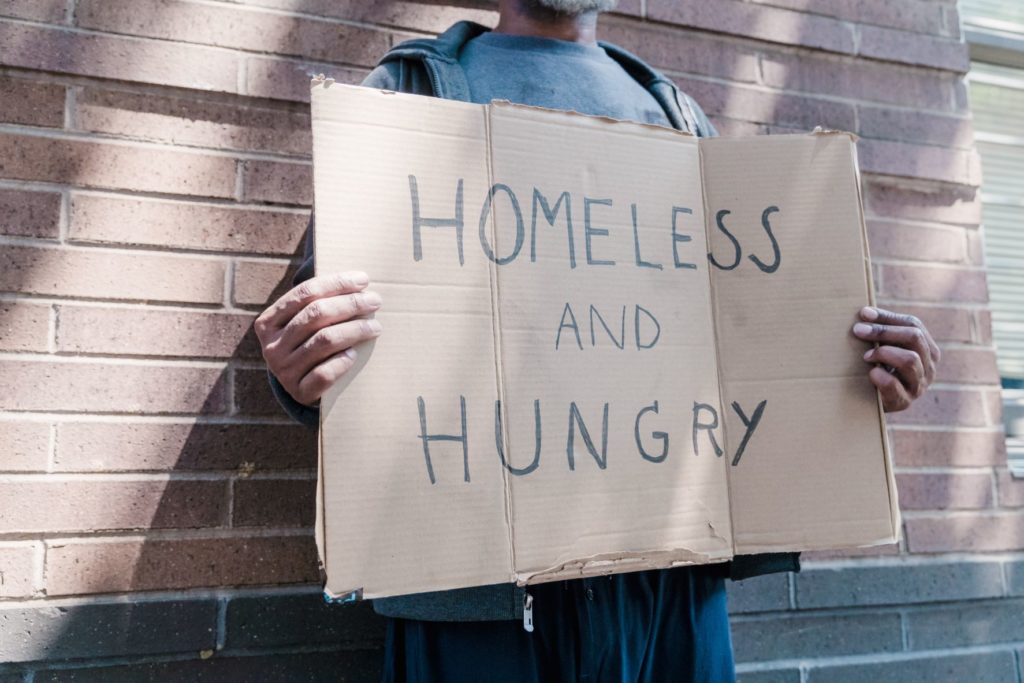
The arrival of colder weather and the holiday season is especially hard on those in our community experiencing housing or food insecurity. The pandemic created hardship for more people, and that’s why economic recovery was one of the top priorities for House Democrats last session.
Instead of cutting services for the most vulnerable in our communities, we invested in keeping people housed and fed with the Washington Recovery Budget (bolstered by funds from the American Rescue Plan Act). This budget is helping people in our district and beyond right now with:
- Rental assistance totaling nearly $1 billion between the Washington Recovery Budget and our early action bill in February
- Mortgage assistance totaling $187 million through the ARPA Homeowner Assistance Fund to help prevent foreclosures and delinquencies
- Funding for food assistance programs totaling $124 million so that families will not go hungry
- Homelessness response and permanent housing supports totaling $292 million
- A 15% increase to temporary cash assistance for the lowest income households, and extended time limits for these benefits to give people more time to get back on their feet
- An increase to the state Housing and Essential Needs Program of $26.5 million to help 1700 more people in our state who are homeless, have disabilities, and are eligible for the program
- An increase of $29 million for the Emergency Cash Assistance program for families who need one-time funds to maintain safe housing and utilities or have an unexpected emergency
Until next year…
Due to state election-year restrictions around legislative communications that kick in next month, I am prohibited from sending any e-newsletters from December 1, 2021 until the start of the 2022 legislative session. This will therefore be my last e-newsletter until the session convenes in January. However, you can continue to follow my legislative Facebook page for news and updates, and I always welcome your emails with questions, comments, or concerns.
Wishing you and those you love a healthy, safe, and happy holiday season.
Sincerely,

Supporting our veterans and their families

Dear friends and neighbors,
Next week our nation observes Veterans Day, a federal and state holiday. With many veterans and their families calling Tacoma and greater Pierce County home, this holiday holds a lot of meaning for many in our community.
Veterans Day recognizes the service and sacrifices of those who are serving or have served our country. But supporting our veterans and their families is a year-round effort.
One of the many ways we can support veterans at the state level is to provide outreach and services to help prevent suicide among veterans and military members. Veteran suicide rates have been increasing and in Washington state, we average more than 200 veteran suicides each year. We need to do more to help protect those who have taken up the call to protect us.
In the 2021 legislative session, a bill advanced out of the House Committee on Housing, Human Services & Veterans. It would extend and modify the Suicide-Safer Homes Task Force, and establish a suicide prevention community-based services grant program to provide peer support and other assistance to at-risk and transitioning military members and their families.
While the bill didn’t make it all the way through the Legislature, I expect to see it taken up again in the 2022 session, and my hope is it will cross the finish line this time. You can follow the bill’s progress here.
Preventing suicide and supporting those experiencing a behavioral health crisis requires a robust infrastructure of trained providers in our state’s communities. That’s why I was so excited about the recent groundbreaking of the new UW Medicine Behavioral Health Teaching Facility on October 15.
Thanks to legislation passed in 2019, a Behavioral Health Innovation and Integration Campus is coming to the University of Washington School of Medicine, increasing access to behavioral health services in our state. Not only will this campus have 150 new behavioral health treatment beds focusing on inpatient and outpatient care, it will also train the behavioral health workforce to meet our state’s growing needs. I was proud to co-sponsor and vote for this bill.
What else has the Legislature done in recent years for veterans and their families?

- Created the position of Military Spouse Liaison within the Washington Department of Veterans Affairs, which provides assistance and information to military spouses seeking professional licenses, credentials or other employment, and helps military spouses access high-quality child care, among other services. Federal and state governments often overlook military spouses when supporting active duty or retired service members. We owe it to military spouses to provide these supports in recognition of the great sacrifices they make, including the loss of opportunities due to frequent relocations and deployments.
- Established an LGBTQ Coordinator within the Washington Department of Veterans Affairs. Our LGBTQ veterans face isolation, stigma, and disproportionate suicide rates. By helping connect these veterans with the services they need, our state makes sure all veterans feel welcome and supported.
- Ensured access to in-state tuition for disabled veterans. By passing this measure, our state was able to continue participation in the federal Choice Act, which enables public institutions of higher education to receive payments under the Montgomery GI Bill, Post-9/11 GI Bill, and other veteran education benefits.
- Expanded access to in-state tuition for veterans and their families. Prior to this legislation, veterans and their families did not qualify for in-state tuition until all discharge paperwork was completed, a process that could take significant time. Now, even if the technical transition from military to civilian life hasn’t been officially completed, veterans and their children can access in-state tuition, making college and postsecondary training more affordable.
- Provided better consumer protections for military service members. When a service member has to relocate to report to a new duty station, this can mean severing contractual ties with memberships and service providers, such as cable, phone and internet providers. Our state’s law now allows members of the military and their families to get out of these contracts without penalty or financial loss.
- Created an Office of Military and Veteran Legal Assistance within the state Attorney General’s Office to promote and facilitate civil legal assistance and pro bono programs. Our military service members, veterans, and their families shouldn’t have to go it alone when it comes to legal issues surrounding things like housing or VA benefits.
- Granted veterans and their spouses who are state employees immediate access to paid leave through the “uniformed service shared leave pool” – without the usual six-month probationary employment period. The six-month limitation meant those service members returning from deployments with injuries or other conditions often had to take unpaid leave for necessary VA medical appointments (if they didn’t have sufficient paid leave banked). Spouses often assist in providing transportation to these appointments. Now both can qualify for shared leave.
To all veterans in the 27th Legislative District: Thank you for your service. We will continue to look at what actions the Legislature can take to provide more support and better opportunities for you and your families.
Welcome, Sen. Trudeau!

On Tuesday, the Pierce County Council voted to unanimously appoint Yasmin Trudeau to the state Senate seat for the 27th Legislative District. She was immediately sworn into office by Washington Chief Justice Steven González.
Sen. Trudeau replaces former Sen. Jeannie Darneille, who recently retired from the Legislature in order to serve as the Assistant Secretary of Women’s Prisons for the state Department of Corrections. She is the first woman of color to serve as senator for the 27th District.
I released this statement on Sen. Trudeau’s appointment, which I hope conveys how very excited I am to work with her on behalf of the people of our district:
“Sen. Trudeau’s appointment is wonderful news for our district, and I’m thrilled to welcome her to the 27th LD delegation. With deep connections to our community through her lived history here, she is immediately ready to take on the work to address the needs of the people and communities we represent. I know she will be a hard-working and effective senator, because she already has a strong track record of involvement in issues like addressing gun violence, making health care accessible and affordable to all, and protecting consumers.
“I was fortunate to serve alongside former Sen. Jeannie Darneille for many years, and she left shoes that no one can possibly fill. But Sen. Trudeau will walk in her own shoes, building her own legacy championing policies that lift all people. I’m excited to be both her seatmate and her constituent.”
Committee Assembly Days are almost here
On November 18-19, House lawmakers will convene virtually for “Committee Assembly Days.” This is when House committees hold public meetings and work sessions to discuss policies and issues likely to come before the Legislature in the coming session (the Senate has their Committee Days on November 15-16).
You can follow what’s happening on the legislative website or on TVW.
It’s an honor to serve as your state representative. If you have any comments, questions, or feedback, please don’t hesitate to contact me.
Sincerely,

Financial aid for college, share your input at the upcoming tax town hall
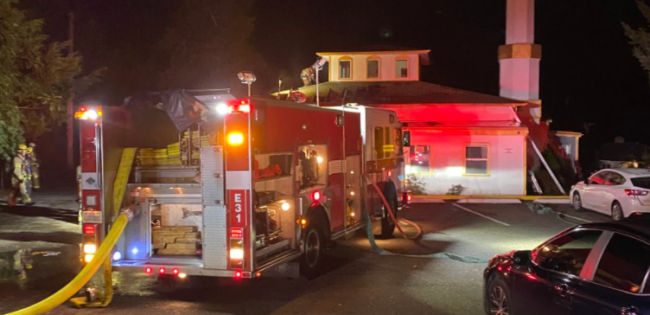
Dear friends and neighbors,
This newsletter begins on a somber note, as I want to acknowledge the recent suspected arson at the Islamic Center of Tacoma. While the Center is located next door in University Place, it has been a place of gathering and worship for Tacoma and Pierce County area Muslims, many of whom live here in the 27th District, for over 40 years. I stand with our community members affected by this terrible crime and joined Gov. Inslee to meet with them on Tuesday.
I agree with the statement released by state Rep. Mari Leavitt of University Place, which said unequivocally that our communities have a right to safely pray and worship, and that hate has no place here in our community or our state.
That’s why I was proud to co-sponsor a bill in 2019 that made changes to our state laws to improve the identification of and response to hate crimes. One outcome of that bill was the formation of the Hate Crime Advisory Working Group within the state Attorney General’s Office, which was tasked with developing strategies to raise awareness of and appropriate responses to hate crime offenses and hate incidents. The group’s report, which came out in 2020, can be viewed here in its entirety.
Hate crimes are on the rise in our state, as newly-released FBI data shows. That’s unacceptable to me, and I will continue to stand against hate and work to strengthen laws that keep all people and communities safe.
October kicks off financial aid application season
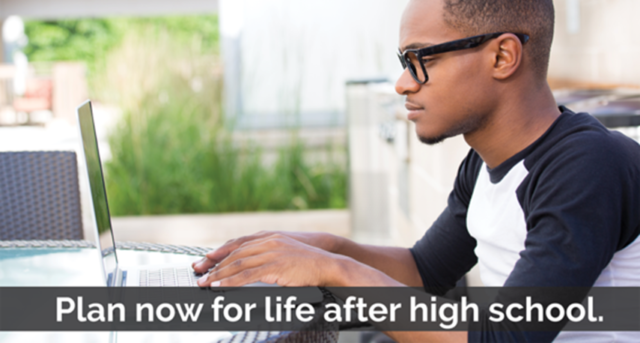
The 2021-2022 school year may have just started, but when it comes to applying for financial aid for college, it’s time to start planning for 2022-2023 already.
Thanks to legislation passed in 2019 and improved in 2020, a family of four making up to $102,000 can qualify for financial aid in Washington, including full tuition for eligible students whose families earn around $56,000 or less per year. It’s called the Washington College Grant.
The Washington College Grant is available to all eligible Washington residents, including undocumented students. This is a grant, not a loan. There is no repayment. And there is even a grant for apprenticeships. It’s one of the best postsecondary financial aid programs in the country.
The Washington Student Achievement Council (WSAC) is providing online support and resources—including virtual events—to help families complete their financial aid applications. Learn more here.
Share your input on modernizing and rebalancing our state’s tax code: Nov. 3rd

As I mentioned in a previous e-newsletter, the Tax Structure Work Group is inviting taxpayers to explore several scenarios to change the state’s tax structure, and this is your opportunity to weigh in.
Washington’s current tax structure places a heavier burden on working families and small businesses than those at the very top of the income bracket and relies on sales, property, and other excise taxes to fund schools, public health, and other vital services. It’s fundamentally inequitable, but there are ways to change it. Taxpayer input is critical to this discussion.
Two virtual Tax Town Halls for folks in our region of the state are scheduled for Wednesday, November 3rd. One is an afternoon session from 2:30-4:00 PM, and the other is an evening session from 6:30-8:00 PM. I will listening in on the evening session that day.
You can register for either town hall online here or via the South/East Puget Sound Tax Town Hall Facebook event.
My interview with NPR’s Austin Jenkins for “Inside Olympia”
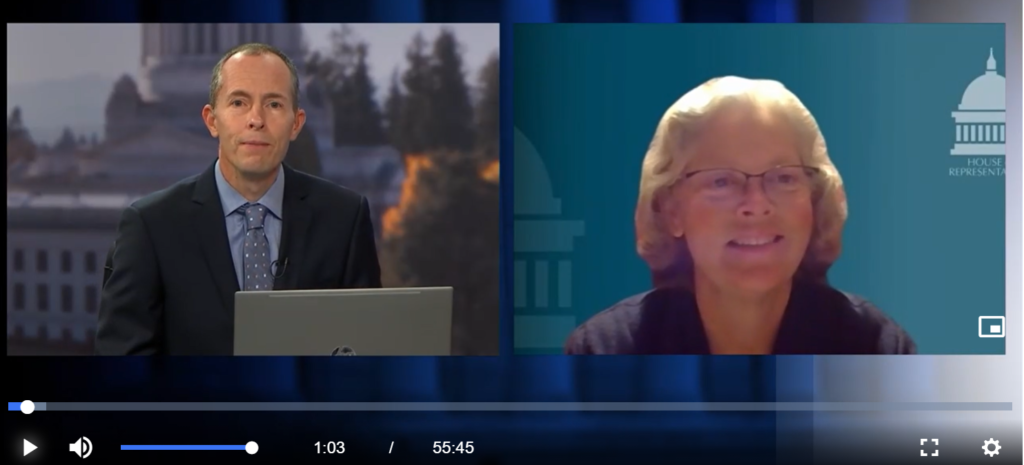
Last month, NPR’s Austin Jenkins interviewed me on Inside Olympia, a show about what’s going on in our state capitol that airs on Washington’s public affairs network, TVW.
The interview covered topics like redistricting, the governor’s vaccination mandates for state employees, the state’s new long-term care benefit for workers, policing reform legislation, and what the 2022 session might look like. The segment is archived here.
It’s an honor and privilege to serve as your state representative. If you have questions, comments, or concerns about a topic covered in this newsletter, or any legislative issue, please don’t hesitate to reach out to me.
Sincerely,

Redistricting, vaccine boosters, and eviction protections
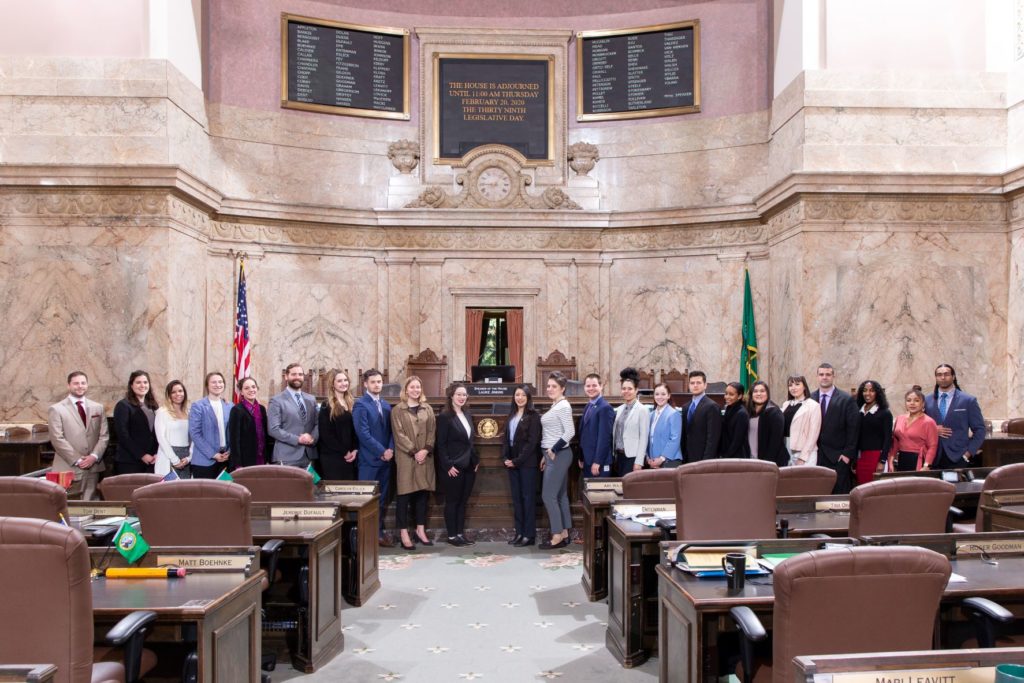
Dear friends and neighbors,
October is here (already!) and preparations for the 2022 legislative session continue in Olympia. That includes planning and preparing for the next cohort of legislative interns.
If you know someone who is currently a college junior or senior in good academic standing, you may want to let them know about the Washington State Legislative Intern Program. Applications are being accepted for the 2022 session now, with a priority deadline of October 15.
More information about intern responsibilities, eligibility requirements, and the application process is available here. Fun fact: interns have been part of each legislative session since 1955, including during the 2021 remote session.
This program is open to students of all majors and backgrounds. No political experience is necessary, just an interest in learning about and participating in the legislative process. Having had the opportunity to work with several outstanding interns who were assigned to my office over the years, I strongly encourage eligible students from the 27th District to learn more about this opportunity.
Proposed redistricting maps are online

Once every 10 years, the political boundaries in our state are redrawn to evenly balance the population among each legislative and congressional district. Doing so ensures each district represents an equal number of residents, because communities and populations change over time.
In our state, an independent redistricting commission is charged with redrawing these boundaries. The commission is made up of four commissioners that are each appointed by the four legislative caucuses, plus a fifth nonvoting commissioner. Back in December 2020, I was proud to appoint April Sims to be the redistricting commissioner for the House Democratic Caucus.
Last month, the commissioners each released their proposed legislative and congressional maps. These proposed maps can be viewed online here.
Now it’s YOUR chance to weigh in. A public outreach meeting on the proposed legislative maps already took place this week on Oct. 5th, but you can still leave a comment on each commissioner’s map even if you didn’t attend the meeting. And you can watch a replay of the full meeting here in English, Spanish, or with ASL interpretation.
A public outreach meeting on the proposed congressional maps is taking place online this Saturday, Oct. 9th. You can watch the meeting or register to comment here.
I hope you’ll add your voice to the conversation. It is critical that the commission’s final maps reflect the input of the people and communities of our state.
COVID-19 booster shots now available to certain populations
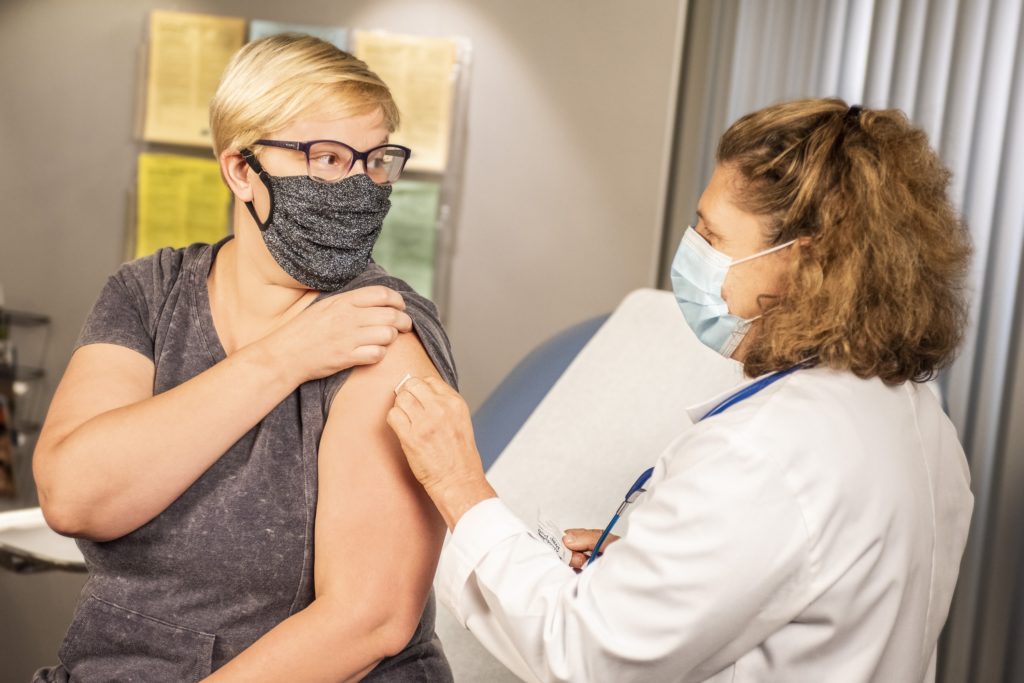
A third “booster” shot of the Pfizer-BioNTech COVID-19 vaccine has been approved by the FDA and the Western States Scientific Safety Review Workgroup. To help protect those most at risk of complications or death from COVID-19, and to help stop community spread of the virus, I urge all qualified individuals to get their booster shot as soon as possible.
The CDC recommends booster doses of Pfizer vaccine for people who have completed two doses of Pfizer at least 6 months ago and are:
- 65 years or older
- Residents in long-term care facilities
- 50-64 years who are at high-risk because of underlying medical conditions
- Essential front line and health care workers who face a high risk of exposure and transmission
The following people may also receive the booster shot at least 6 months after receiving two doses of Pfizer vaccine based on their individual benefits and risks:
- 18-49 years who are at high-risk because of underlying medical conditions.
- 18-64 years in occupational or institutional settings that put them at high risk for COVID-19 (healthcare, schools, childcare, homeless shelters, correctional facilities).
You can find a COVID-19 vaccination appointment here.
Housing stability “bridge” extended through Oct. 31
The governor recently extended the housing stability “bridge” proclamation through Oct. 31st, continuing protections for certain renters who are struggling to recover financially from the pandemic.
If you currently need rent assistance or anticipate not being able to pay rent, apply now to ensure you are protected, even if your application is not processed before October 31.
Multiple tenant protections specifically designed to provide help to those who need it were signed into law this past session. This includes the new Eviction Resolution Pilot Program, which helps people avoid losing their home.
I’m proud of the steps the legislature took this year to strengthen renter protections, provide rental assistance, and bolster economic survival measures to make sure people emerge successfully from the severe economic hardship brought on by the COVID-19 pandemic. Here are some additional resources:
- Housing and other rights in multiple languages: www.walawhelp.org
- Toll Free Eviction Defense Screening line: 855-657-8387.
- Washington State Attorney General’s question/complain form: submit questions or concerns online here, or call 1-833-660-4877 to leave a message.
Landlords who lost rent or have property damage caused by tenants can also access funding through the Landlord Mitigation Program.
Thanks for reading this e-newsletter. It is an honor to serve as your state representative, and I hope you will reach out to me with your comments, questions, and concerns.
Sincerely,

Upcoming town hall: Rebalancing and modernizing our tax code

Dear friends and neighbors,
We officially entered fall this week, and it certainly feels like it. Leaves are changing colors and falling from the trees, the air more crisp, and the sun sets a little earlier each evening. Whether you love fall or hate it, it is definitely a season of change.
Preparations for the next legislative session get fully underway in the fall. In the House, we are planning for Committee Assembly Days in November, when legislative committees will meet to discuss issues likely to come before the Legislature next year. You can find out when these public meetings will happen and sign up for committee email notifications on this page.
I know many of you are wondering if the 2022 legislative session will be held in person, remotely, or in some hybrid fashion.
My preference – and I think every legislator’s preference – is that we can all be together in Olympia, in-person. If we are able to do that, it will mean that COVID-19 is under control and the capitol campus is safe for the public, staff, and lawmakers to return.
The 2021 session was an enormously productive one despite having been held remotely, with historic public engagement through remote testimony options and not a single case of COVID traced to the work of the Legislature. All along, state and local public health guidance have driven the decision making about how to conduct session, and that will continue to be the case heading into 2022.
The good news is now the infrastructure exists to have an effective, transparent legislative session even if we have to be remote or partially remote.
That said, I hope people continue to get vaccinated, mask up, and take every precaution to stop the spread of the virus in our communities. If we all do our part, we can get back to normal operations sooner and safely.
It’s too early to know for sure how things will look in January, but I will keep you informed about plans for the 2022 session in these newsletters and on my legislative Facebook page.
You are invited: A town hall on rebalancing & modernizing our state’s tax code
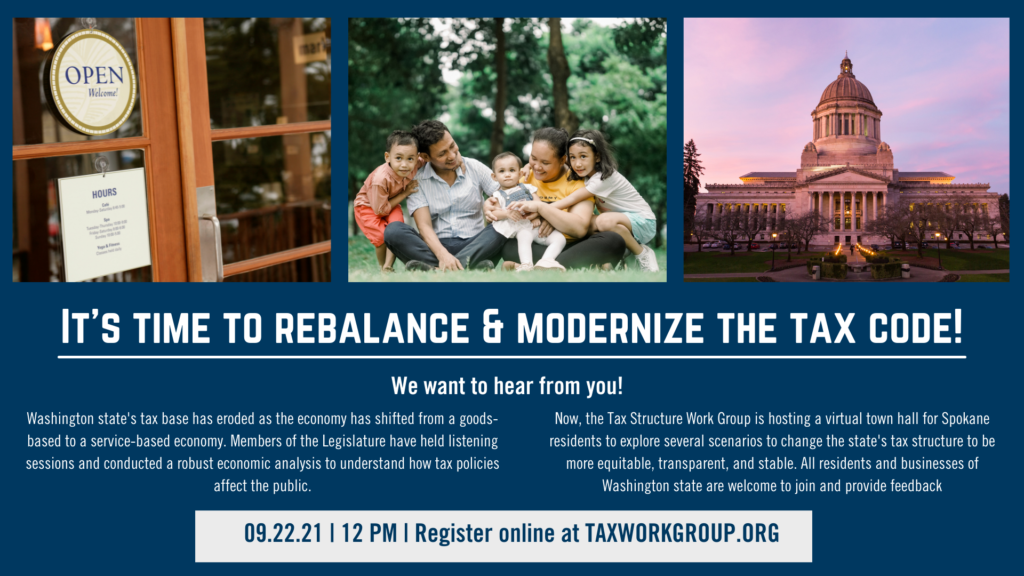
Over the past two years, the Tax Structure Work Group has held listening sessions and conducted robust analysis to find out how the Legislature can create a more equitable, transparent, and stable tax code.
Washington’s current tax structure places a heavier burden on working families and small businesses than those at the very top of the income bracket and relies on sales, property, and other excise taxes to fund schools, public health, and other vital services. It’s fundamentally inequitable, but there are ways to change it.
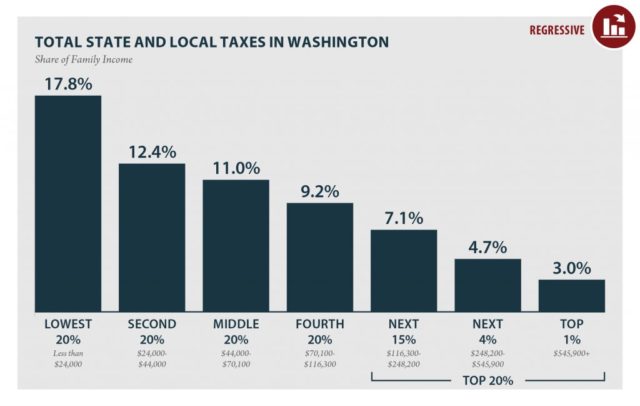
The Tax Structure Work Group is inviting taxpayers to explore several scenarios to change the state’s tax structure, and this is your opportunity to weigh in. How do you think the state can better provide vital state services like schools and public health through an improved tax code?
Virtual “Tax Town Halls” are taking place this fall. These 90-minute interactive listening and sharing sessions provide opportunities to share your thoughts and ideas with your neighbors, local businesses, elected officials, and extended community. All taxpayers are welcome – you don’t need to be an accountant or tax expert to participate! The sessions will be conducted remotely on Zoom – if you have any questions or accessibility concerns please contact info@taxworkgroup.org.
If you live or work in the 27th Legislative District, I hope you’ll join one of the two virtual Tax Town Halls on Wednesday, November 3rd for folks in our region. There’s an afternoon session from 2:30-4:00 PM, and an evening session from 6:30-8:00 PM. I’ll be listening to your comments during the evening session that day.
You can register for the town hall online here or via the South/East Puget Sound Tax Town Hall Facebook event.
Thank you, Sen. Darneille
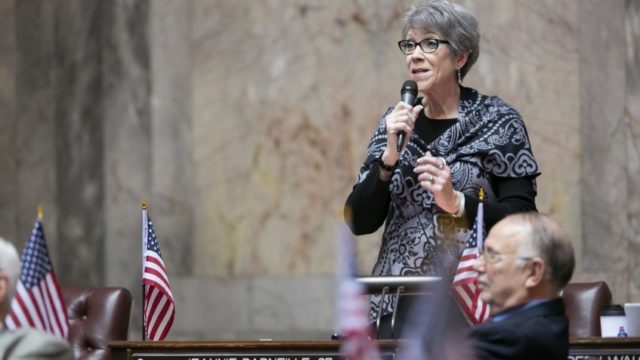
This week, my friend and 27th District seatmate, Sen. Jeannie Darneille, announced her retirement from the Legislature.
Sen. Darneille has served our district for over two decades, first in the state House, and since 2013 in the state Senate, where she chairs the Human Services, Reentry & Rehabilitation Committee.
She has had an incredible impact during her legislative career, championing policies that have made our state safer for all people, and helping countless individuals live fulfilling lives and contribute in many positive ways to our communities. She leaves a lasting and inspiring legacy as a legislator. You can read my statement about her retirement here.
Please join me in wishing Sen. Darneille well as she transitions to her new role as Assistant Secretary — Women’s Prison Division for the Department of Corrections.
As the days get shorter and the temperatures cooler, I hope you and your loved ones have a safe and healthy fall. Please don’t hesitate to contact me with your feedback, questions, or concerns. It’s an honor to represent you.
Sincerely,

Back to school
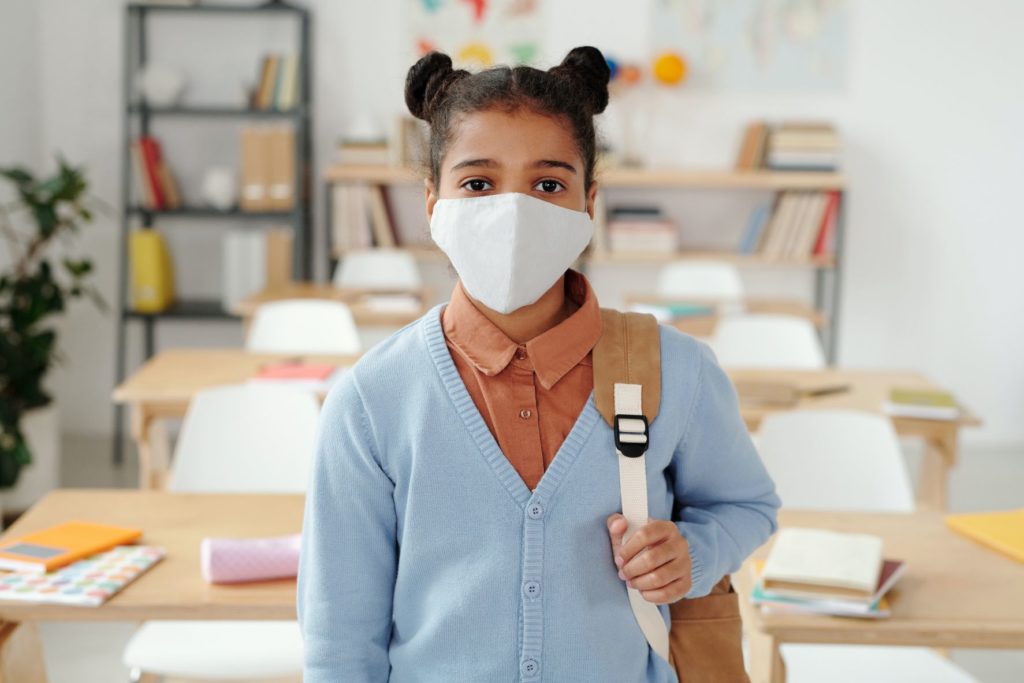
Dear friends and neighbors,
Yesterday was the first day of school for Tacoma Public Schools. I have fond memories of my son’s first day of school throughout his K-12 journey. The first day is usually an exciting one for students, families, teachers and staff. This year, families may also be feeling some uncertainty or apprehension given concerns about the spread of COVID-19 among unvaccinated children. At this time, there is not yet an approved vaccine against COVID-19 for children younger than 12 years of age.
The safety and well-being of everyone in our schools is a top concern of mine, as it is for the educators and staff who are entrusted with our students’ learning. That’s why one of the first actions the Legislature took last session was to get funding to school districts prepare for a safe return to in-person learning. Our early action bill allocated:
- $618 million for vaccine distribution, contact tracing, and testing with an emphasis on vaccinating individuals needed for school re-opening, and
- $714 million in support for school districts to address learning loss
The Washington Recovery Budget that went into effect on July 1 utilizes state revenues and federal funding from the American Rescue Plan Act (ARPA) to expand public health response to the pandemic, including:
- $1.2 billion for COVID-19 vaccines, contact tracing and testing
- $149 million for local public health districts across our state, which are on the front lines of the pandemic
- $11 million for school nurses
Our schools are taking every precaution to ensure our children’s safety, and districts will continue to communicate with families about the steps they are taking in their schools to protect students, teachers, and staff. Rather than creating “one size fits all” precautions for all of Washington’s school districts, our funding provided flexibility for communities to design the interventions that work best for them.
Tacoma Public Schools recently announced free, voluntary COVID-19 testing in schools through a partnership with the Washington State Department of Health. Results are available in 24-48 hours.
Vaccines remain best defense against COVID-19
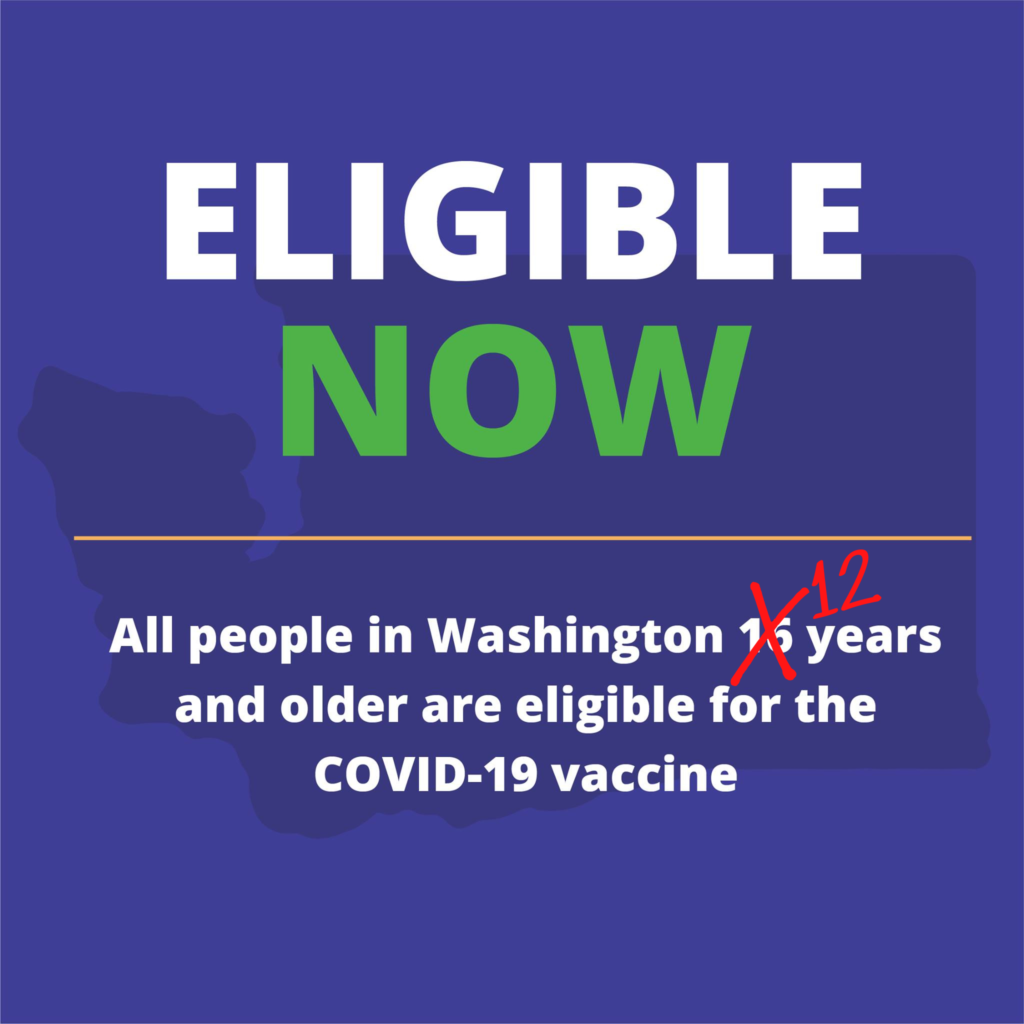
With growing concerns around the Delta variant, current public health guidelines say it is essential to be masking up indoors and maintaining social distancing, regardless of vaccination status.
For those 12 and older who can get vaccinated, this remains the most important step we can take to protect our loved ones, neighbors, and community members who are either too young or not able to get the vaccine. To find a COVID-19 vaccination appointment, visit the state Department of Health’s vaccine locator web page.
We’re all in this together!
Helping students thrive
Every student deserves the opportunity to learn and thrive, whether we’re in a pandemic or not. That’s why I’m glad the Legislature passed the following measures last session to help students in Tacoma and across the state get that opportunity:
Eliminating school lunch co-pays
Hungry kids can’t learn. Prior to the pandemic, one in six Washington state children lived in a food insecure household. Now, it is one in four. And families of color are 1.5 times more likely to go hungry. Almost half of all Washington school children are enrolled in subsidized school meals. Reduced lunches required a family copay, and while forty cents may not seem like much, for a family struggling to make ends meet it can mean a child going to class with an empty stomach.
This year, we eliminated the copay for reduced lunches, giving students a chance to get a meal so they can focus on their school work, not hunger pangs.
Promoting consistent attendance
Going to class regularly is critical to success in school. Thanks to a bill last session, we’re giving additional support and flexibility for schools to engage their students, promote attendance, and address the root causes of absences instead of simply criminalizing truancy. By utilizing community engagement boards and wraparound services to avoid court involvement, districts and families can work together to help students show up and take part in school.
Addressing lead in school drinking water
There is no scientifically safe level of lead in drinking water. Lead can harm children – especially young children – by lowering their IQ or causing neurological issues. To ensure students have access to safe, clean drinking water in our schools, lawmakers passed a bill establishing a deadline for the state Department of Health to test all public school faucets used for drinking water or food preparation. If elevated lead levels are found, the pipes and fixtures will be repaired.
Does your student’s school have lead in its drinking water? Check test results from the Department of Health here (updated weekly).
As the school year progresses, please reach out to me with any thoughts, feedback, or concerns you may have. To all the teachers, paraeducators, school staff, bus drivers, school nurses, counselors and other folks who are part of each student’s day: thank you for all you do, especially in these uncertain and challenging times.
Sincerely,

Vaccine requirements, long-term care, and park chats
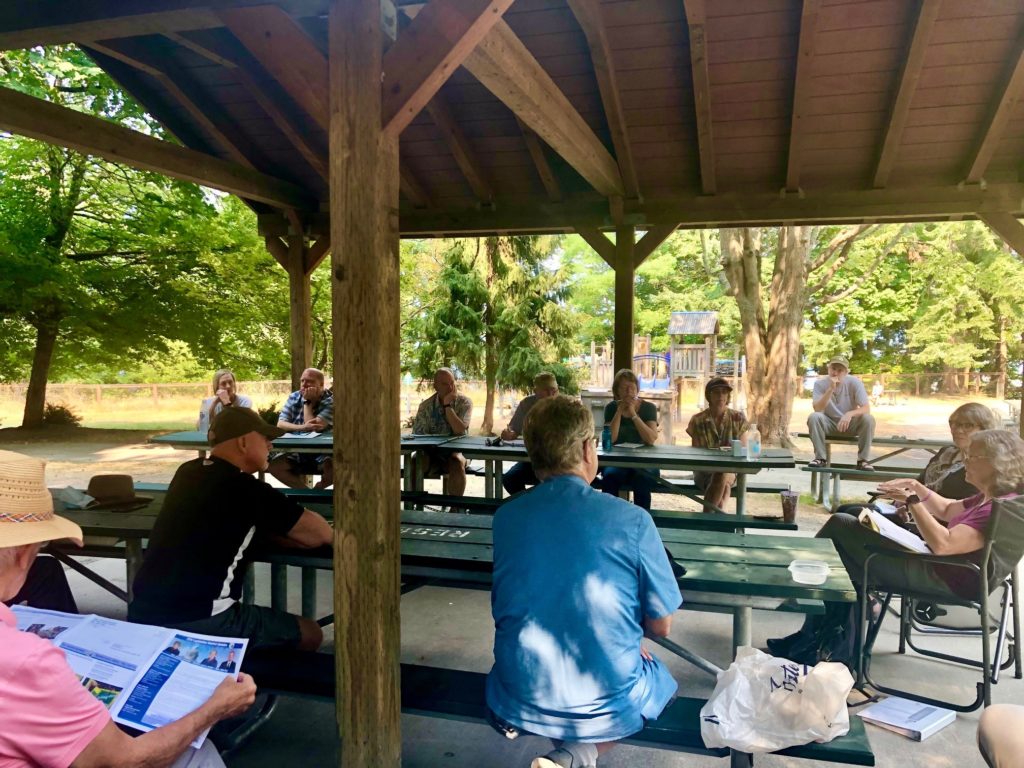
Dear friends and neighbors,
My e-newsletter was on a brief summer hiatus, but hopefully you received the 27th Legislative District Update from Sen. Darneille, Rep. Fey and me that was mailed to households last month. If not, it’s available here on my legislative website.
Together with Sen. Darneille and Rep. Fey, I’ve also held several constituent “park chats” this summer — informal, drop-in conversations in public parks throughout the district. So far we’ve met at Stewart Heights Park, Franklin Park, and Point Defiance Park. These gatherings have been a safe, outdoor, socially-distanced alternative to the indoor “coffee chats” we’ve hosted in previous years.
If you haven’t had a chance yet to drop by one of our park chats, the next one will be Tuesday, August 31st from 3:00 to 5:00 PM at Lincoln Park, at the picnic tables on the S. Thompson Ave. side of the park. Seating will be limited, so please consider bringing a chair for yourself if you’re able to do so. Hope to see you there!
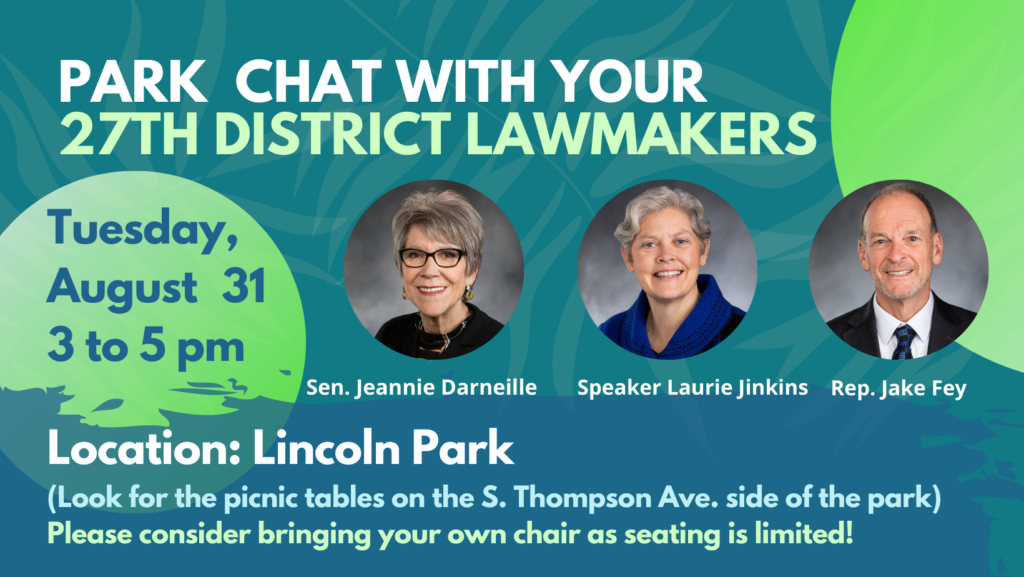
New vaccination requirements for state workers, health care professionals, K-12 employees and others
The State of Washington is taking decisive action to combat the spread of COVID-19 and protect vulnerable communities by requiring most state workers, workers in private health care/long-term care settings, and employees in K-12, child care/early learning and higher education settings to be vaccinated as a condition of employment.
On August 9, the governor announced mandatory COVID-19 vaccination requirements for most state employees and health care workers. Senate Majority Leader Andy Billig and I released a statement in support of that decision.
On August 18, the governor announced mandatory COVID-19 vaccination requirements for employees working in K-12, most childcare and early learning, and higher education settings. Additionally, he announced an expansion of the statewide mask mandate to all individuals, regardless of vaccination status.
Getting vaccinated and masking up are critical to help protect those most at risk in our communities from complications or death from COVID-19 — in particular children under 12 who are not yet able to get vaccinated, and those who are immunocompromised.
The Delta variant has caused skyrocketing COVID-19 cases in our state and across the nation. Other states are struggling with an alarming rise in cases in schools, leading to closures, quarantines, and child hospitalizations. The only way to stop this from happening in Washington state is by ensuring the vast majority of us who can get vaccinated, do*.
*The vaccination requirements still allow for limited exemptions, such as for sincerely held religious beliefs or legitimate medical reasons.
WA Cares Fund: making long-term care more affordable for Washingtonians
In 2019, the Legislature passed the Long-Term Care Trust Act to address a looming crisis in our state: Most of us will need some type of long-term care services or supports as we age. But the vast majority of us don’t have the savings to pay for this care, or a long-term care insurance policy.
Legislators shared heartbreaking stories on the House floor about how this issue has touched their own families:
Rep. Nicole Macri of Seattle: “I remember talking to the administrator of the nursing home about how much private care would cost. And I remember bawling.”
Rep. Cindy Ryu of Shoreline: “By the time Dad needed help, Mom was getting frail.”
Rep. Tana Senn of Mercer Island: “This long-term care plan is about families…it’s about keeping families together, in their homes, with their loved ones, as long as possible.”
I shared my own family’s struggle to find care for my mother-in-law, Jeannette, who has since passed away.
Legislators also described how this policy makes economic sense and is a win for families and taxpayers:
Rep. Steve Tharinger: “You’ll take a benefit out that will be greater than what you put in…unless you live to be 126 years old.”
Rep. Drew MacEwen (my co-sponsor across the aisle): “Twenty years ago to buy a long-term care policy on the private market made economic sense…but that changed.”
The Long-Term Care Trust Act was a first-in-the-nation kind of policy when the governor signed it into law. Other states are grappling with long-term care accessibility and affordability too, and they are watching what we’re doing about it here in Washington.
The Tacoma News Tribune editorialized in favor of the policy in 2019, saying, “It could provide relief for older Washingtonians seeking a modest sum for long-term care in their twilight years; for sandwich-generation family members trying to make sound decisions for elderly parents; and for taxpayers to the tune of an estimated $470 million in state Medicaid savings by 2052.”
So, where are we now?
Payroll deductions for what has since been named the WA Cares Fund begin in 2022. Those who already have long-term care insurance or who purchase a plan before Nov. 1 can apply for an exemption from this program. While purchasing a private plan before Nov. 1 may makes sense for some, it’s important to make your decision based on a real analysis, not misinformation or confusion. To be clear:
- The benefits you earn can be used flexibly, including paying for things like nursing care, assisted living, home care, family caregivers, home modifications and meal delivery.
- You cannot be excluded from the plan based on any pre-existing conditions.
- Once you’ve vested into the WA Cares Fund, that money is available to you for life. If you opt out, you cannot later opt back in to access benefits.
More information about WA Cares is available in this informative blog post from the state Office of the Insurance Commissioner. You can also learn more about the Fund, how to earn and apply for benefits, and more at the WA Cares Fund website.
Bottom line: Like all new programs, it will take some time to adjust and determine where there may need to be changes. But it’s critical for Washington state to have a long term care program that will help protect taxpayers and provide families peace of mind.
If you have questions or comments about anything in this newsletter, or other legislative topics, please don’t hesitate to contact me. It’s an honor to represent you.
Sincerely,

Join us at Franklin Park on Tuesday, July 27
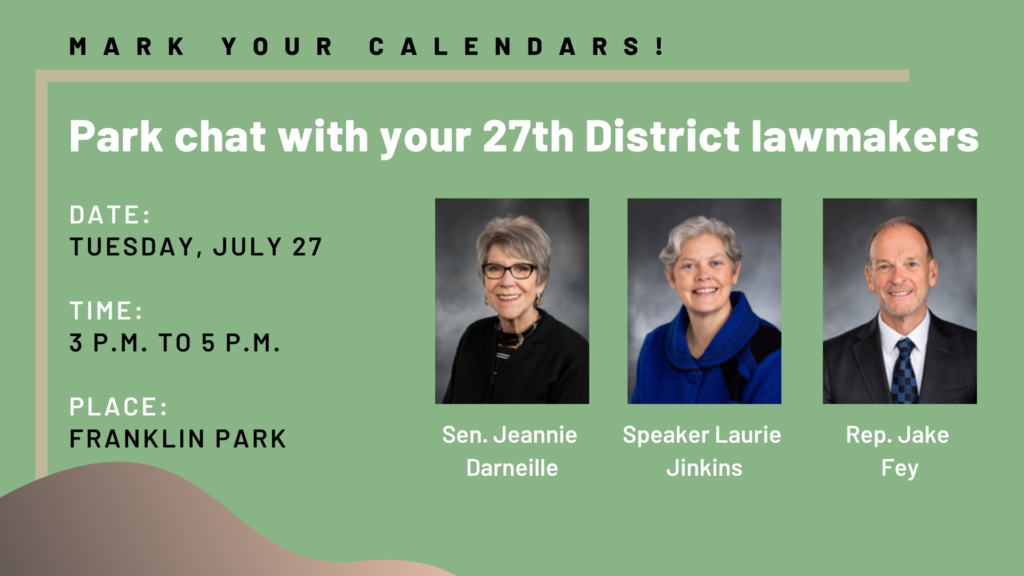
Dear friends and neighbors,
Throughout the summer, Sen. Jeannie Darneille, Rep. Jake Fey and I are holding a series of constituent “park chats” – an outdoor version of our “coffee chats” from previous years.
We had a great turnout at our first event on July 17 at Stewart Heights Park. The next scheduled park chat is on Tuesday, July 27 from 3 p.m. to 5 p.m. at Franklin Park, under the covered structure.
We hope you can join us for this informal, drop-in conversation about the recent legislative session and the issues important to the people and families in our district.
Sincerely,

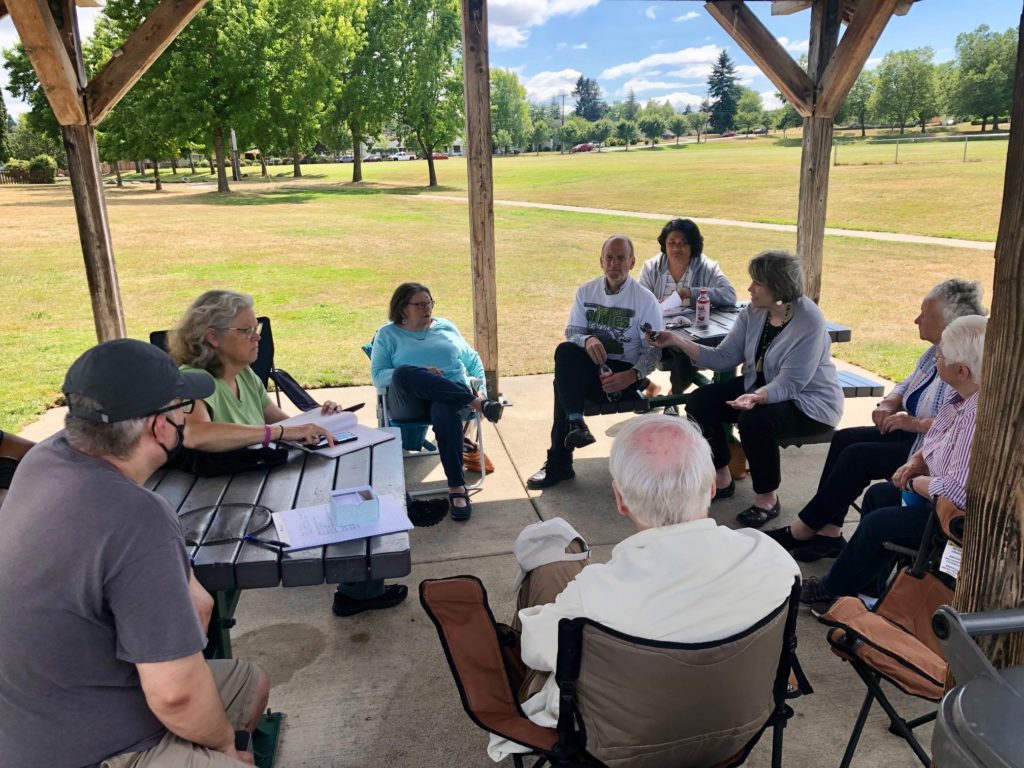
Washington Recovery Budget kicks in, meet me for drop-in “park hours” this month
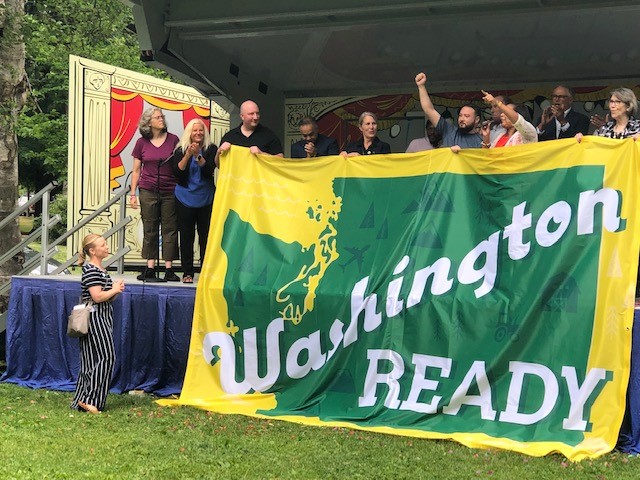
Dear friends and neighbors,
“Welcome back, Tacoma!”
That was the theme of yesterday’s celebration in Wright Park, marking the reopening of our state and the end of most COVID restrictions. It was great to be there along with Governor Inslee, Mayor Woodards, and others, turning a page on one of the most challenging times our community and our state have faced, and moving forward together in recovering from this pandemic.
Back on January 11, I delivered opening remarks to a mostly-empty House chamber on the first day of a historic, unprecedented remote legislative session. At the time I said, “ Our job for every minute of the next 105 days is to not just keep hope alive for the people of our great state, but to make hope a reality.”
Standing on the stage in Wright Park yesterday, it felt like that hopeful reality has arrived. As the new state budget goes into effect today, hope will continue spreading across our state, promoting an equitable and inclusive recovery.
*** Just yesterday, the state Department of Commerce launched a new loan fund to help small businesses and non-profits (those with fewer than 50 employees and less than $3 million in revenue) affected by the pandemic reopen and rebuild. For more information about the Small Business Flex Fund and how to apply, click here.***
Washington Recovery Budget starts today
July 1 marks the beginning of the fiscal year for state government. Today is also the first day of the new two-year budget lawmakers passed during the 2021 session.
We call it the Washington Recovery Budget because we all stuck out this pandemic together, and
now it is time we recover together.
That’s why we focused our work during the legislative session on centering and prioritizing the people and communities that have suffered the most health, economic, and education impacts from the COVID-19 pandemic, and that face the most barriers to recovery.
The Washington Recovery Budget addresses these impacts and barriers by:
- Boosting public health – with $1.2 billion for COVID-19 vaccines, contact tracing, and testing
- Ensuring people have stable housing – with $1 billion in rental assistance, plus hundreds of millions more for mortgage assistance, homelessness response, and permanent housing supports
- Providing unemployment insurance tax relief to small businesses and small business
grants to help keep doors open – with $700 million in small business supports - Expanding food assistance programs so kids don’t go hungry – with $124 million in food assistance
- Investing in our early learning and child care system so that families can go back to work – with $827 million for child care provider grants, child care assistance for families, expanded child care slots, and more
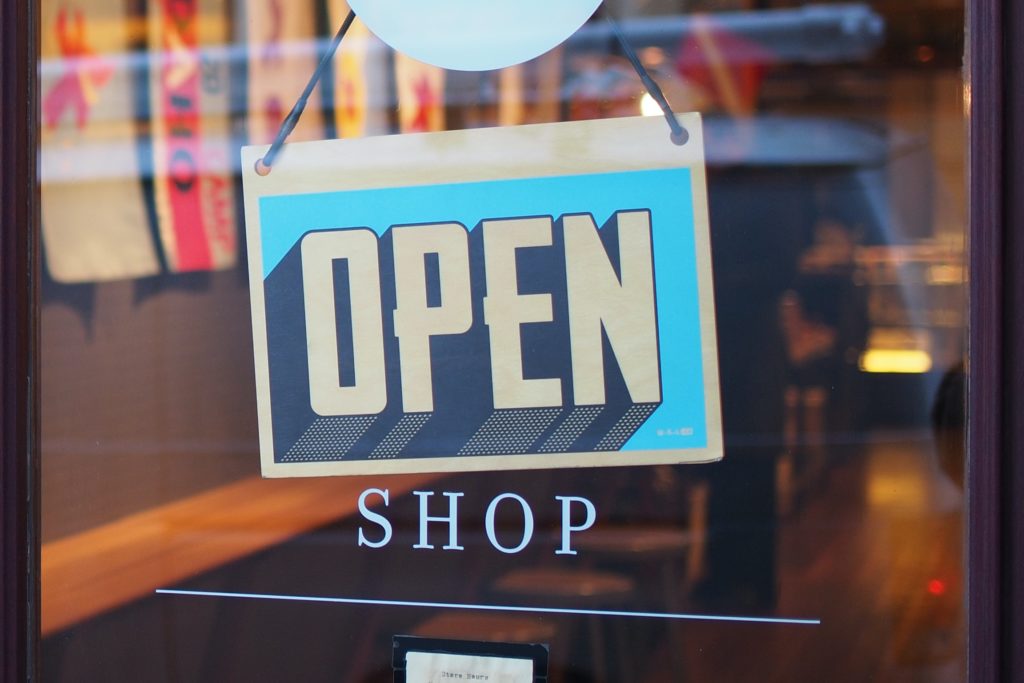
Meet me in the park: Constituent “park hours” are set
As mentioned in my previous e-newsletter, the informal drop-in “coffee hours” I’ve held in the past are moving outdoors this year. We are so fortunate to have many wonderful public parks in our community, so I’ve scheduled several of these “park hours” in July and August at locations around the district.
Rep. Jake Fey and Sen. Jeannie Darneille may be joining me for some of these events. If you’re able, drop by and join us for a conversation about the issues that are important to our community:
Stewart Heights Park – 5715 Reginald Gutierrez Ln, Tacoma
Saturday, July 17
3-5 PM
(location: covered structure)
Franklin Park – 1201 S. Puget Sound Ave, Tacoma
Tuesday, July 27
3-5 PM
(location: covered structure)
Point Defiance Park – 5400 N Pearl St, Tacoma
Tuesday, August 3
3-5 PM
(location: covered structure near entrance/playground)
Lincoln Park – 801 S 37th St, Tacoma
Tuesday, August 31
3-5 PM
(location: covered structure)
Reminder: Monday, July 5 is a state holiday
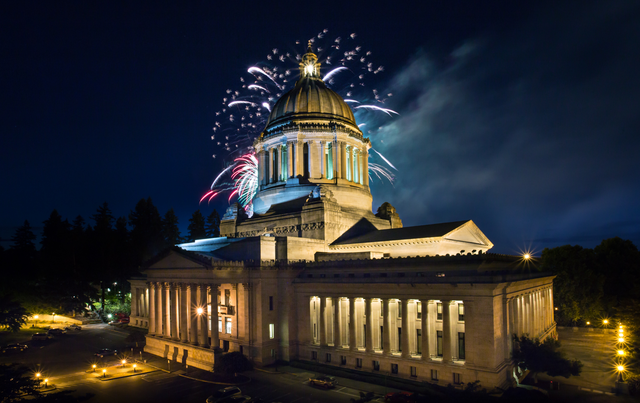
Because the 4th of July falls on a Sunday this year, most state and federal agencies, as well as most financial institutions, will be closed on Monday, July 5th, in observance of the Independence Day holiday.
If you celebrate this weekend, please stay safe and observe local fireworks regulations. Personal fireworks use is prohibited with the City of Tacoma. More information can be found on the city’s website.
I wish you and your loved ones a safe and happy holiday weekend. It’s an honor representing you in our state legislature.
Sincerely,

